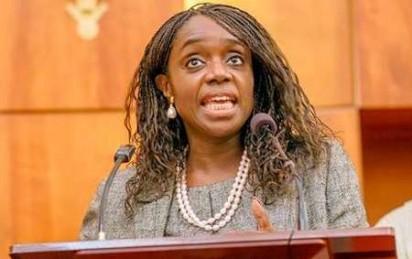
Minister of Finance, Kemi Adeosun
By Dele Sobowale
“We are simply saying that we have a very credible plan for dealing with the challenges we are facing, which we’ve been very honest about…there is still a long way to go…diversifying and repositioning” will bear fruit..” Minister of Finance, PUNCH, July 25, 2016, p 40.
That the Nigerian economy is in a recession is no longer news. In fact, for some of us, it was predictable, even long before the Economic Management Team was aware that it was on the way.
The International Monetary Fund, IMF, recently projected contraction of 1.8% for 2016. The Federal Government while not officially contesting the IMF estimates still clings to the faint hope that “the economy will show recovery in the third quarter of this year” (Mrs Adeosun).

Minister of Finance, Kemi Adeosun
One month of that quarter is over and there is no sign of recovery simply because there is no money to bring about a rebound.
The statements quoted above raise the question: what is the outlook for the rest of 2016? Asking government officials is useless. They will be the last to forecast bad news. They prefer the unpleasant surprise first and they can offer excuses after for the failure.
In the report by PUNCH, Mrs Adeosun, is on her way to the World Bank, cap in hand, to present the nation’s policy support document which would make it possible for us to source for $11bn [N387bn] from the external financial markets to help plug the hole created by budget deficits already incurred this year.
Before addressing the statements credited to the Minister, we need to quickly summarise where the nation stood as at the end of the first four months and then make projections for the rest of the year. Those figures will help us in deciding how much reliance we can place on the utterances of what the President calls his Economic Management Team, EMT.
In that same PUNCH, President Buhari reportedly asked, obviously in anger, ‘What do they mean by team? The Vice-President heads our economic management team.” It probably never occurred to Buhari that the question keeps occurring because most Nigerians with vast experience in economics and finance don’t think much about the quality of his “team”. To be quite candid, it is lightweight compared to others in the past and there has been nothing to induce confidence in the group.
The VP is a magnificent lawyer but nobody has ever accused him of being a great economist; the same goes for the Ministers of Finance, Budget and Trade. Even the CBN Governor is a banker and one of the best bankers Nigeria has ever produced, Mr Atedo Peterside, during the race for banking consolidation in 2004/5 told the truth that “it is much more difficult to be a great economist than to be a banker.”
At any rate, the CBN Governor is only responsible for monetary policy. Without sound fiscal policy, which the President, or his surrogate (in this case the VP) and the Minister of Finance provide, the economy is like a bird flying with one wing. Until recently, the CBN Governor was even prevented from introducing the measures required to soften the impact of an inevitable recession by a President who adamantly refused to consider devaluation of the currency until it was almost too late.
Nobody on the EMT had the guts to argue until Buhari went to London and was persuaded. Even then the CBN “floated” the currency and only recently permitted market forces to determine the rates.
These were the pre-conditions imposed by the global financial markets from which we seek the loans. We wasted precious time and Mrs Adeosun is now just on her way to start discussions which should have been concluded in April.
This is the end of July and the funds will not start to flow, if at all, until August by which time our debt burden would have increased and our ability to repay would have been further impaired.
A quick look at the results for the first four months suggest the economy is in far worse condition than anybody envisaged. In fact, the results are so off the mark the 2016 budget might as well be thrown into the dust bin. Nothing done from August to December would redeem it.
Against a revenue budget of N1.5tn, the actual revenue generated was N660bn or 44% of budget and the deficit was N890bn or -56%. Results for May and June are not yet available, but, one needs no doctorate in economics to realise that the trend started in January and continued to April had not been reversed. Governments still have no money to spend.
No major new private investment had occurred, aggregate consumption is either stagnant or declining and foreign exchange inflow is low. All the variables which can stimulate a reversal were going down and there is no light at the end of the dark tunnel.
Mrs Adeosun, like all government officials, is forced to be optimistic, even if there is no evidence to support her predictions. When she claims that “a boost in [agricultural] output is expected this year”, one is forced to ask if she had consulted the Meteorological Services who would have told her that the nation, on the whole, has experienced the lowest rainfall in decades this year.
“Low cost loans to farmers” is more fiction than real and “improved distribution” can only take place if there is any fertilizer to distribute in the first place. For most of the year, farmers have had little fertilizer supplied. How can imaginary boost in agricultural output help to “bridge the shortfall in oil revenue” as she falsely claimed? The outlook for the rest of 2016 is discouraging because what the President’s Economic Management Team announces is pure drivel.
Disclaimer
Comments expressed here do not reflect the opinions of Vanguard newspapers or any employee thereof.